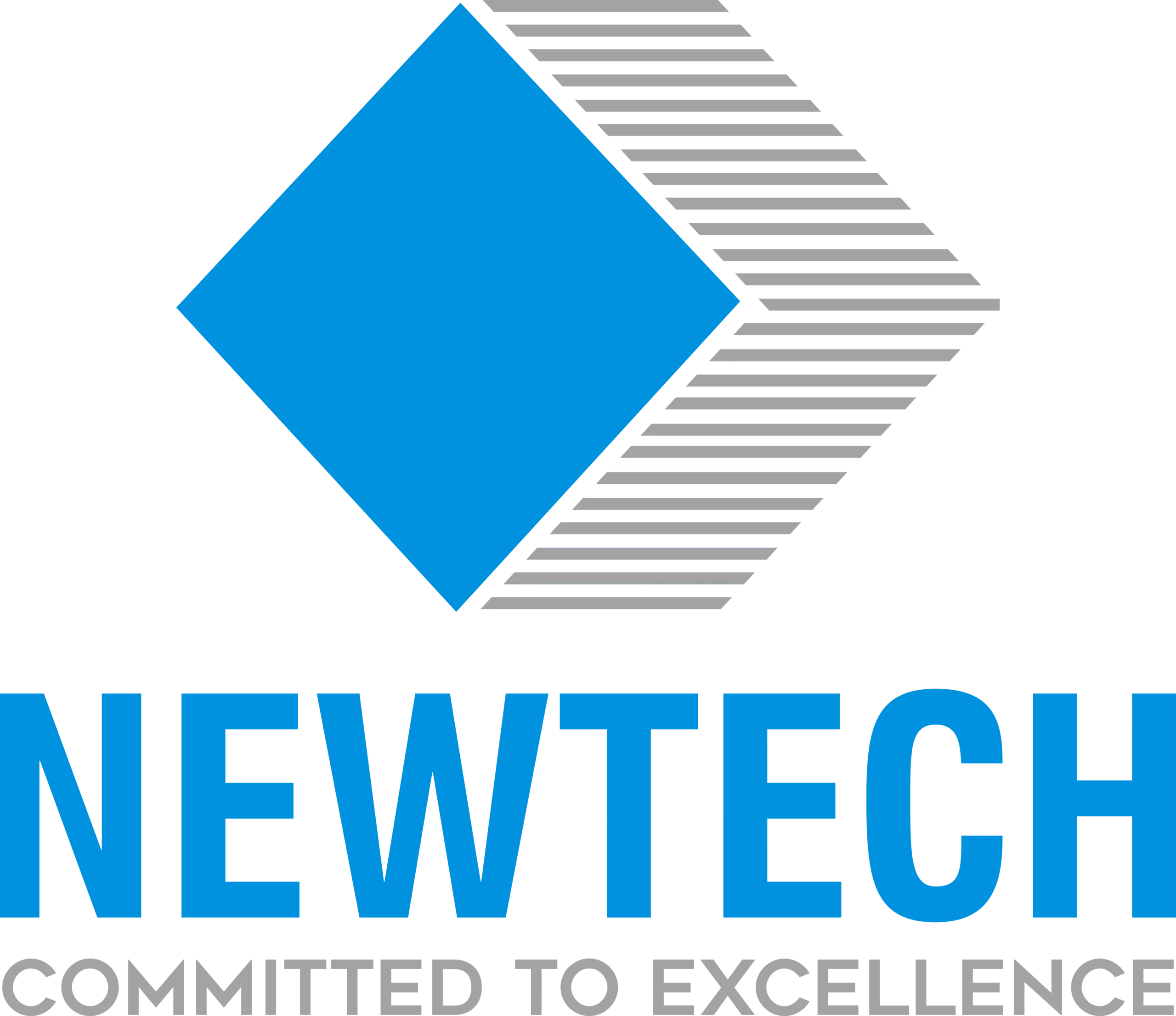UPVC Pipes Manufacturers in Pakistan
A Modern & Durable Piping Solution
Looking for a piping solution that’s built to last? uPVC (Unplasticized Polyvinyl Chloride) is changing the game. It’s tough, chemical-resistant, and saves you money over time.
Unlike traditional materials like metal or concrete, uPVC is highly resistant to rust, corrosion, and material degradation. This makes it an ideal choice for various applications, including plumbing systems, drainage networks, water supply pipelines, electrical conduits, and industrial fluid management, ensuring durability, reliability, and long-lasting performance across residential, commercial, and industrial projects.
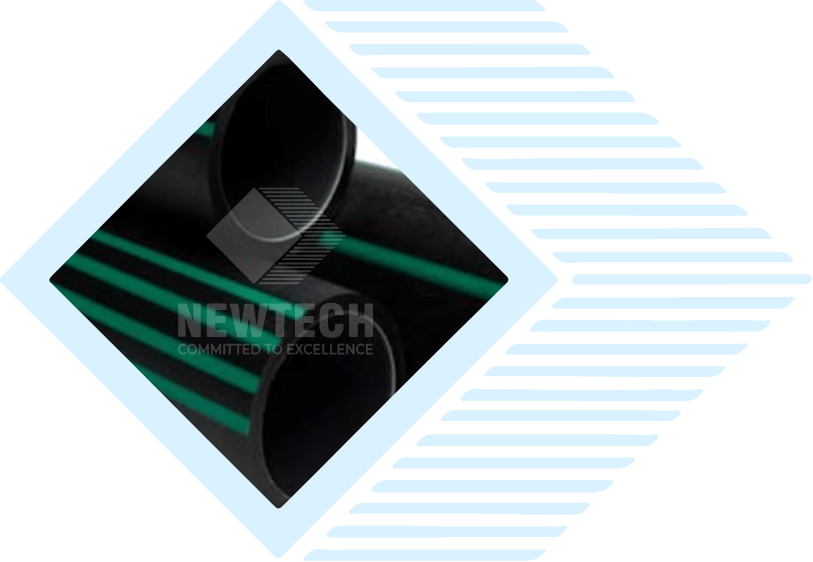
At Newtech Pipes, we provide premium-quality uPVC Pipes & Fittings that comply with international standards (BS, ASTM, PS, etc.), ensuring maximum reliability and long-term performance.
What is uPVC?
uPVC (Unplasticized Polyvinyl Chloride) is a rigid and durable form of PVC widely used in construction, plumbing, and industrial piping applications. Unlike traditional PVC, uPVC contains no plasticizers, making it stronger, more weather-resistant, and highly chemical-resistant — ideal for demanding environments.
For optimal performance, always use uPVC pipes with compatible fittings to ensure secure, leak-free connections. First developed in Germany during the 1960s as a long-lasting alternative to conventional materials, uPVC has since become a preferred choice for residential, commercial, and industrial projects, gradually replacing cast iron, galvanized steel, and copper pipes.
Installation & Maintenance Guide for uPVC Pipes
Step-by-Step Installation Process
- Measure & Cut – Use a fine-toothed saw for precise cutting
- Measure & Cut – Use a fine-toothed saw for precise cutting
- Apply Solvent Cement – Ensure a strong, leak-proof joint
- Fit & Secure the Pipe – Properly align the fittings
- Allow Setting Time – Let the cement dry for a solid connection
Maintenance Tips for uPVC Pipes
- Regularly inspect pipes for leaks & damages
- Avoid exposing pipes to excessive pressure
- Use compatible fittings & connectors
Applications of uPVC Pipes & Fittings
- Plumbing Systems – Used for both hot & cold water supply
- Drainage & Sewerage Systems – Reliable for wastewater management
- Irrigation & Agriculture – Ideal for water distribution in farms
- HVAC Systems – Essential for ventilation and cooling systems
- Industrial Applications – Used in factories for fluid transportation
- Electrical Conduit Systems – Provides protection for electrical wiring
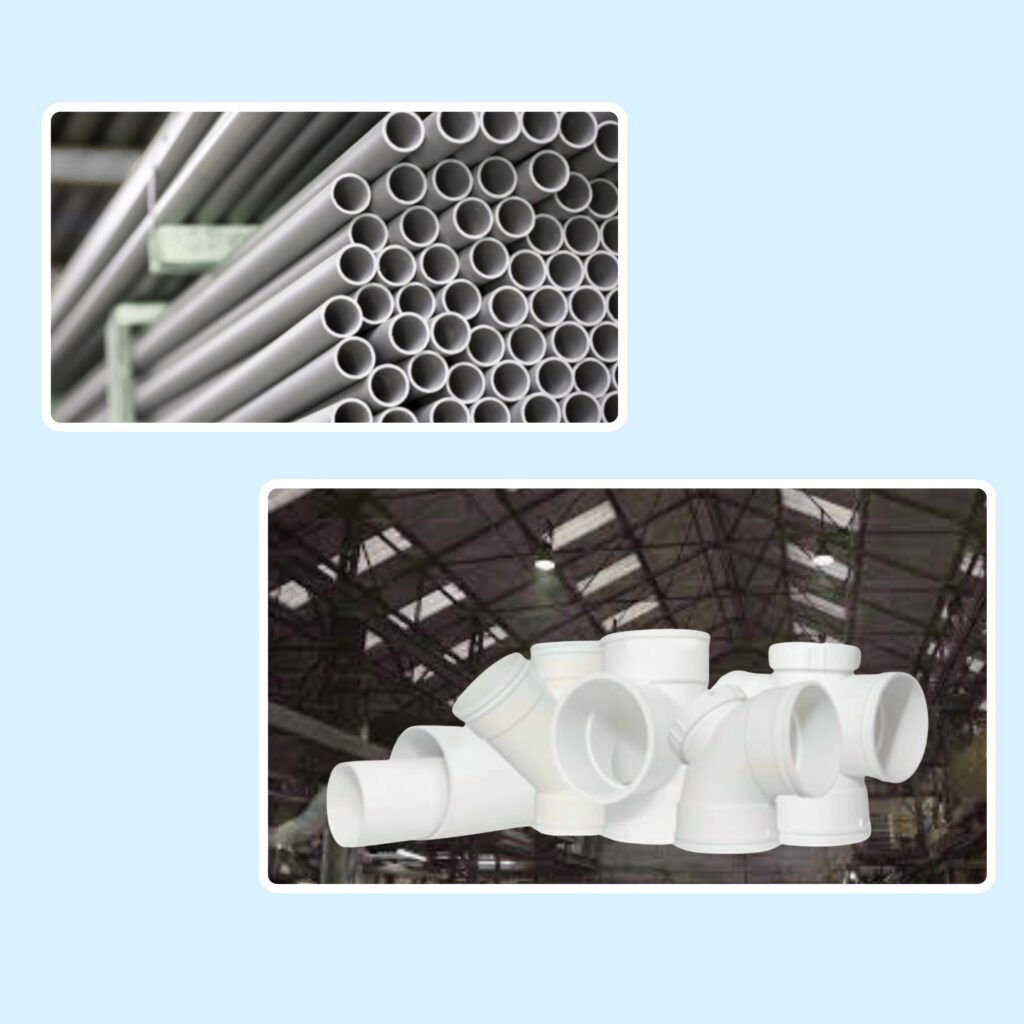
Features of Our Piping Solutions
- Premium Quality Finish Each pipe is manufactured with a smooth internal and external surface to ensure seamless flow and easy handling.
- Low Friction Loss Designed with a low coefficient of flow friction, our pipes help maintain optimal pressure and reduce energy costs.
- Chemical Resistance Built to resist harmful chemicals commonly found in domestic wastewater and industrial discharge.
- Heat Stability Our pipes remain stable and retain their integrity even under elevated temperatures.
- Weather-Resistant Formulation Engineered to withstand extreme weather conditions, making them ideal for long-term outdoor applications.
High-Quality Pipes & Fittings – Built to Last
Key Advantages
- Superior Performance Built for reliability in residential, commercial, and industrial systems.
- Excellent Chemical and Corrosion Resistance Long-lasting performance even in harsh chemical environments.
- Enhanced Flow Efficiency High flow capacity ensures optimal fluid movement with minimal blockage
- Durability and Structural Strength Made from robust materials that resist cracks, leaks, and pressure damage.
- Cost-Effective Installation Lightweight and easy to handle, reducing labor time and installation expenses.
Types of uPVC Pipes & Fittings at Newtech Pipes
At Newtech Pipes, we offer a wide range of uPVC products designed for various applications:
uPVC Drainage & Sewerage Pipes
uPVC Pressure Pipes
Electrical Conduit Pipes & Fittings
SDR Series uPVC Pipes
uPVC Drainage & Sewerage Pipes
- Designed for wastewater management
- Strong, leak-proof, and resistant to chemicals
- Compliant with BS, ASTM, and PS standards
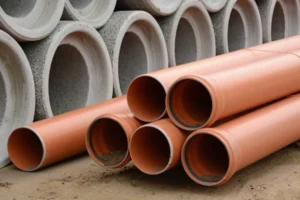
uPVC Pressure Pipes
- Ideal for high-pressure water supply systems
- Available in different diameters & pressure ratings
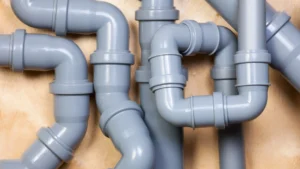
Electrical Conduit Pipes & Fittings
- Protects electrical cables from moisture & external damage
- Fire-resistant and insulated for safe installation

SDR Series uPVC Pipes
- Standard Dimension Ratio (SDR) pipes for varied pressure applications
- Used in commercial & residential plumbing systems
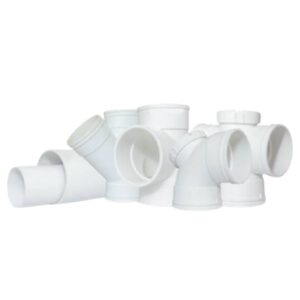
Comparison of uPVC, PVC, Metal, and Concrete Pipes
| Feature | uPVC Pipes | PVC Pipes | Metal Pipes | Concrete Pipes |
|---|---|---|---|---|
| Weight | Lightweight | Lightweight | Heavy | Very Heavy |
| Corrosion Resistance | Excellent (No Rust) | Moderate | Prone to Rust | No Rust |
| Durability | 50+ Years | 30-50 Years | 20-50 Years | 50+ Years |
| Installation | Easy & Quick | Easy | Labor-Intensive | Very Labor-Intensive |
| Cost | Affordable | Moderate | Expensive | Expensive |
| Maintenance | Minimal | Low | Requires Regular Maintenance | Moderate |
| Chemical Resistance | Highly Resistant | Moderate | Susceptible to Damage | Good Resistance |
| Environmental Impact | Eco-friendly | Moderate | High Carbon Footprint | Neutral |
| Application | Plumbing, Drainage, Agriculture | Plumbing, Drainage | Industrial, Gas, Oil | Large Infrastructure Projects |
Get a quote via email
Get a quote via Whatsapp
Frequently Asked Questions
Q1. What is the difference between PVC and uPVC pipes?
PVC (Polyvinyl Chloride) is flexible and contains plasticizers, while uPVC (Unplasticized PVC) is rigid and more durable. uPVC is commonly used for water supply and drainage because of its strength, weather resistance, and chemical stability.
Q2. Are uPVC pipes safe for drinking water?
Yes, uPVC pipes are non-toxic, lead-free, and resistant to chemicals, making them safe for potable water supply systems. They do not affect water taste or quality.
Q3. How long do uPVC pipes last?
When properly installed and maintained, uPVC pipes can last over 50 years. They are highly resistant to rust, corrosion, and chemical damage, which makes them ideal for long-term use.
Q4. Can uPVC pipes be used underground?
Absolutely. uPVC pipes are widely used in underground drainage, sewerage, and water supply systems due to their durability and resistance to soil and chemical corrosion.
Q5. What are the main advantages of using uPVC fittings?
uPVC fittings offer leak-proof connections, easy installation, and long-term performance. They also help reduce installation time and cost due to their lightweight nature.
Q6. Are Newtech uPVC pipes certified?
Yes, Newtech uPVC pipes and fittings comply with international standards such as BS, ASTM, and PS, ensuring top-tier quality, safety, and reliability.
Q7. Do uPVC pipes require regular maintenance?
Not much. One of the key benefits of uPVC is its low maintenance requirements. Periodic checks for physical damage or leaks are usually sufficient.
Q8. Where can I use Newtech uPVC pipes?
Our pipes are ideal for home plumbing, drainage, agriculture, industrial fluid transport, HVAC systems, and electrical conduits. Their versatility makes them suitable for nearly any environment.
Q9: Do uPVC pipes require special tools for installation?
A: No, uPVC pipes are easy to install using simple tools and solvent cement for joining, making them a convenient choice for various applications.
Q10: Are uPVC pipes resistant to UV radiation?
A: Standard uPVC pipes can degrade under prolonged exposure to sunlight, but UV-stabilized versions are available for outdoor applications.

